![]()
Mon, May 16, 2011 | Turkey Analyst, vol. 4 no. 10 | By Halil M. Karaveli
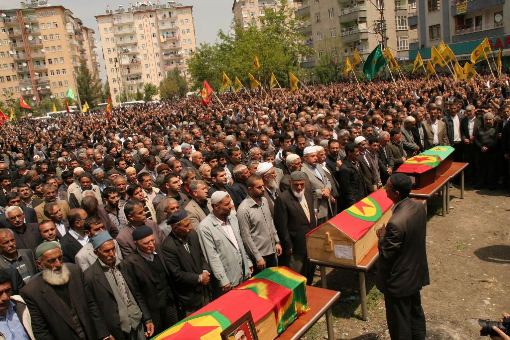
A large crowd attended the funeral ceremony of four Kurdish guerrillas at Diyarbakır Bayramoglu Mosque. (www.kurdish-info.eu)
Is the AKP that “Vanquished” the Military Caught in the Trap of Militarism?
This article was first published in the Turkey Analyst (www.turkeyanalyst.org), a biweekly publication of the Central Asia-Caucasus Institute & Silk Road Studies Program Joint Center. © Central Asia-Caucasus Institute & Silk Road Studies Program Joint Center.
There is a grim irony to the fact that while the AKP’s 2007 victory represented a defeat for the military, victory four years later requires that the ideology — Turkish nationalism — that upholds militarism not be challenged. The AKP’s appeasement of Turkish nationalism lays bare the limits of how far Turkey’s democratization can be extended. Meanwhile, the army’s unprovoked offensive against Kurdish guerillas in the southeast of the country reveals how the manipulation of the Kurdish issue serves as a lever for perpetuating the power of the military.
Background
The general election of 2007 dealt a severe blow to the power and prestige of Turkey’s military and civilian state establishment. The attempt of the General staff to assert its authority over the government of Justice and Development Party (AKP) and prevent the election of Abdullah Gül as president backfired badly when the ruling party, which refused to yield to the dictates of the military, was rewarded with 47 percent of the votes. Since then, the military has suffered a string of humiliating defeats as the civilian authorities have turned the tables on the high brass.
It is a testimony to the setback that the military has endured during the last four years that nearly two hundred active duty and retired military officers — among whom the former commanders of the navy and the air force — are incarcerated, charged with having plotted to overthrow the government. Another striking measure of this defeat is that one out of ten serving generals and admirals are in jail. Like no other Turkish leader before him, Prime Minister Erdoğan has succeeded in asserting civilian authority over the generals. Indeed, the Turkish novelist and Nobel laureate Orhan Pamuk recently remarked that it is Erdoğan’s “greatest achievement” to have rolled back the power of the military. Yet the fact that a score of generals have been put behind bars does not necessarily imply that their ideology has been circumscribed as well.
The polls suggest that Erdoğan is very likely to score a third, consecutive electoral victory in the upcoming June 12 election. Most estimates put the support for the AKP in the range of 45 percent. Yet while the 2007 election appeared to have ushered in a de-militarization of Turkish politics, the 2011 election is going to be held against the backdrop of a democratic regression, as it has become clear that militarism is far from having been expunged from the Turkish body politic.
On the night between May 12 and 13, twelve guerillas of the Kurdistan Workers Party (PKK) were killed when they were engaged by Turkish army units on the Turkish-Iraqi border under unclear circumstances. Two weeks earlier, seven Kurdish guerillas were killed in an unprovoked assault by the army in the province of Tunceli (Dersim in Kurdish). During the last month nearly forty Kurdish guerillas have been disposed of by the army in similar assaults. And as the army has gone on the offensive in the mountains of the southeast, the police have concurrently staged a new wave of arrests of local Kurdish politicians in the cities of the region. In retaliation, the PKK has staged attacks in which three police officers have been slain during the last two weeks. The offensive of the Turkish army has inflamed emotions in the Kurdish-dominated southeast of the country; Kurds flocked to the border region where the recent army attack took place to recover the bodies of the twelve guerillas, and 100,000 mourners were estimated to have participated in the funeral services of four slain guerillas in Diyarbakır on May 4. The anger and resentment that is brewing ominously among the Kurds was also demonstrated when mass protests were staged against the subsequently rescinded decision of the Supreme Electoral Board last month to veto several Kurdish parliamentary candidates. Psychologically, Turkey is coming apart; for the Turks, the guerillas are “terrorists” who get what they deserve.
Implications
The unexpected Kurdish offensive of the Turkish armed forces is at first glance intriguing as the Kurdish guerillas had been abiding by the unilateral cease fire that the organization had proclaimed last summer, and not least against the backdrop of the negotiations that are being conducted by state representatives with Abdullah Öcalan, the imprisoned leader of the PKK. Öcalan observed that “when we started the negotiations, we had agreed that there was not going to be any killings and arrests”. The Kurds were also incensed by Prime Minister Erdoğan’s recent claim that “there is no Kurdish issue, only the problems of my citizens of Kurdish origin”; the statement is particularly offending since it basically amounts to a denial of the existence of a Kurdish people. The statement followed on the purge that has left the AKP’s candidate lists almost entirely void of prominent Kurds and seemed to be another confirmation that the AKP government has abandoned any thought of accommodating the demand of the Kurds that they be accorded equality with the Turks.
However, there are those who hold that appearances notwithstanding, the AKP has not surrendered to Turkish nationalism and militarism — that on the contrary, the ruling party is a target of the machinations of the “deep state”. Galip Ensarioğlu, an AKP candidate from Diyarbakir, defended the AKP, arguing it is only pretending to have yielded to Turkish nationalism; he intimated that the military operations are not authorized by the government. He blamed those within the state establishment who dread the prospect of a democratic constitution, which the AKP as well as the main opposition Republican People’s Party (CHP) has pledged to introduce after the elections. One explanation that has been ventured is that there are “two states” that are battling each other, with one part of the state establishment engaging in talks with Öcalan, with the opposing fraction staging military and police operations aimed at obstructing the peace efforts; and it may be part of the calculus that an escalation of Turkish-Kurdish tensions will benefit the Nationalist Action party (MHP) and the Kurdish Peace and democracy party (BDP), narrowing the AKP’s margin of victory.
While the National Intelligence Agency (MIT), presumed to be the agency that is conducting the talks with Öcalan, seems to be a vehicle of a more enlightened approach to the Kurdish issue, the General staff undoubtedly remains a stronghold of unreconstructed Turkish nationalism. Abdullah Öcalan claims that the unidentified group of state emissaries with which he has been meeting regularly has not been able to persuade the General Staff and the AKP government, suggesting that the two are in collusion. On the other hand, it would be a mistake — in view of what has transpired in Turkey since the AKP came to power — to dismiss the opposite interpretation, that the military operations are being undertaken in defiance of the government by army commanders who are conspiring to finish off the AKP. However, such an interpretation fails to provide an explanation as to why the police — which has served the interests of the AKP in its power struggle with the military — is simultaneously rounding up Kurdish representatives.
Selahattin Demirtaş, the former leader of the BDP, puts it bluntly: “We assume that it was the AKP that ordered the military to go on the offensive. The AKP is simply trying to get more votes by killing as many PKK guerillas as possible. It’s all about playing the Turkish nationalist card.” The AKP’s rivals can obviously not be expected to judge it fairly, yet Erdoğan’s statement that there is not a Kurdish issue, and the dismissal from the party lists of prominent Kurdish representatives have tarnished the image of the AKP in the eyes of conservative, pro-AKP Kurds as well, and lends credibility to the assertion that the party has indeed to all intents and purposes joined hands with the military.
Abdullah Öcalan predicts that there will “either be grand settlement or a big war” after the elections. Aysel Tuğluk, a prominent representative of the Kurdish movement, warned that the southeast risked erupting like Syria is doing. It is indeed not implausible that the unrest in neighboring Syria, which counts a sizeable, and increasingly restive, Kurdish minority in the regions adjacent to Turkey, will have cross-border effects. While Turkey has been held up as a “model” in the wake of the “Arab spring”, it may itself end up with a hot “Kurdish summer”.

Kurdish protesters clash with Turkish riot police in Diyarbakir, December 2009. (Osman Orsal/Reuters)
Conclusions
There is a grim irony to the fact that while the AKP’s 2007 victory represented a defeat for the military, victory four years later requires that the ideology — Turkish nationalism — that upholds militarism is not challenged. The AKP’s appeasement of Turkish nationalism may be purely tactically motivated; yet what is revealing and truly consequential is that it is deemed politically imperative to cater to Turkish nationalism. That lays bare the limits of how far Turkey’s democratization can be extended. And the deeper implication of the army’s provocative offensive against the Kurdish guerillas is that the manipulation of the Kurdish issue continues to serve as a lever for perpetuating the power of the military. And even though the generals have been on the losing end of the power struggle with the AKP, their ideology is vindicated when Prime Minister Erdoğan states that “there is no Kurdish issue”.
Ultimately, it is the claim and perception that Turkey faces an existential threat from an “internal enemy” that bestows legitimacy on the military as a political arbiter. As long as Turkey has not come to terms with its constituent diversity and settled for a solution that acknowledges that reality, rolling back the power of the military will at best remain an unfinished business.
Erdoğan’s achievement as he faced down the once all powerful high brass has certainly not been insignificant; nonetheless, there were several historical precedents to the AKP’s resounding victory in 2007. Voters in Turkey do have a record of rewarding political parties that have either stood up against the military or otherwise represented a challenge to the generals’ claim to be the ultimate arbiters of the country. However, what no Turkish ruling party or prime minister has ever dared to challenge is the notion that the Turks are the undisputed masters and sole owners of Turkey. In the absence of what would truly have been an epic achievement, a liberal political order will continue to elude Turkey.
About the author,
Halil M. Karaveli is Senior Fellow and Managing Editor of the Turkey Analyst at the Central Asia-Caucasus Institute and Silk Road Studies Program Joint Center.



 RSS
RSS

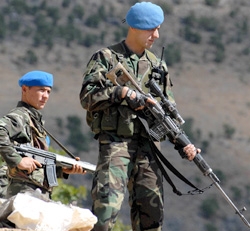

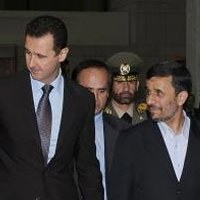
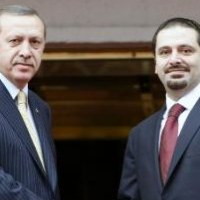


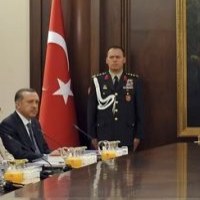












Is the #AKP that “Vanquished” the Military Caught in the Trap of Militarism? | #Turkey #PKK #Kurds #Erdogan http://j.mp/m45HWa
Is the #AKP that “Vanquished” the Military Caught in the Trap of Militarism? | #Turkey #PKK #Kurds #Erdogan http://j.mp/m45HWa